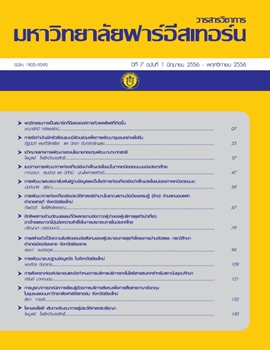อิทธิพลทางด้านวัฒนธรรมที่มีผลกระทบต่อภาวะผู้นำของผู้บริหารธุรกิจนำเที่ยว ชาวไทยและชาวญี่ปุ่นต่อความสำเร็จในการประกอบการในประเทศไทย
Main Article Content
Abstract
การศึกษาเรื่องอิทธิพลทางด้านวัฒนธรรมที่มีผลกระต่อภาวะผู้นำของผู้บริหารธุรกิจนำเที่ยวชาวไทยและ ชาวญี่ปุ่นต่อความสำเร็จในการประกอบการในประเทศไทย มีวัตถุประสงค์เพื่อศึกษาอิทธิพลของวัฒนธรรมประจำชาติ ที่มีผลกระทบต่อภาวะผู้นำของผู้บริหารธุรกิจนำเที่ยวชาวไทยและชาวญี่ปุ่นที่ประกอบธุรกิจในประเทศไทย ตลอดจน รูปแบบคุณลักษณะภาวะผู้นำที่นำไปสู่ความสำเร็จของผู้บริหารธุรกิจชาวไทยและชาวญี่ปุ่นที่เน้นการจัดการนำ นักท่องเที่ยวชาวญี่ปุ่นเข้ามาท่องเที่ยวในประเทศไทย ทำการศึกษาข้อมูลเชิงคุณภาพโดยรวบรวมจากเอกสารที่ เกี่ยวข้อง และสัมภาษณ์เชิงลึกผู้บริหารธุรกิจชาวไทยและชาวญี่ปุ่น จำนวน 20 คน ประกอบด้วย ผู้บริหารธุรกิจชาวไทย จำนวน 10 คน และผู้บริหารธุรกิจชาวญี่ปุ่น จำนวน 10 คน
ผลการศึกษา พบว่า ผู้บริหารธุรกิจนำเที่ยวชาวไทยและชาวญี่ปุ่น มีรูปแบบการบริหารธุรกิจนำเที่ยวโดยใช้ อิทธิพลและวัฒนธรรมประจำชาติมาใช้ในการบริหารธุรกิจเช่นเดียวกัน โดยมีกระบวนการในการสร้างกฎระเบียบ และข้อบังคับ เพื่อให้พนักงานยืดถือเป็นข้อปฏิบัติ โดยมีการควบคุมและกวดขันพนักงาน หากพนักงานสามารถปฏิบัติงาน ได้เสร็จสิ้นตามเป้าหมาย ก็จะมีการให้รางวัลและสินนำใจหรือคำชมเพื่อเป็นการสร้างขวัญและกำลังใจให้แก่พนักงาน ซึ่งมีความแตกต่างกันทางด้านการบริหารทรัพยากรบุคคล คือ ผู้บริหารธุรกิจชาวไทยจะมีการประนีประนอม มีความ อ่อนน้อมถ่อมตน เพื่อลดความขัดแย้งในองค์กร ซึ่งเป็นผลมาจากอิทธิพลและวัฒนธรรมของคนไทยที่ไม่นิยมใช้ความ รุนแรง สำหรับผู้บริหารธุรกิจชาวญี่ปุ่นใช้กฎเกณฑ์ ระเบียบ และข้อบังคับต่างๆ มาเป็นกรอบเพื่อให้พนักงานดำเนินการ ตามมาตรฐานตามแนวทางการให้บริการอย่างเคร่งครัด
สำหรับมิติทางวัฒนธรรมมีความสอดคล้องกับค่ามิติของ (Hofstede, 1983a) ด้านที่ 6 คือวัฒนธรรมทาง ด้านการหน่วงเหนี่ยว - การผ่อนผัน (Indulgence VS. Restraint) กล่าวคือ การบริหารธุรกิจใดๆ ก็ตาม ซึ่งหากมีการ ตั้งค่านิยม ประเพณี วัฒนธรรม กฎระเบียบ ข้อบังคับ สำหรับการดำเนินชีวิตตามระเบียบสังคม จารีตประเพณีสูง ย่อมหมายถึงการมีระดับค่าการหน่วงเหนี่ยวผ่อนผันสูงเช่นกันซึ่งสอดคล้องกับผลการสัมภาษณ์ผู้บริหารธุรกิจนำเที่ยว ชาวไทยและชาวญี่ปุ่นที่บริหารธุรกิจนำเที่ยว โดยสร้างกฎระเบียบ และข้อบังคับ เพื่อให้พนักงานยืดถือเป็นข้อปฏิบัต
จากการศึกษาคุณลักษณะภาวะผู้นำที่นำไปสู่ความสำเร็จ พบว่า ผู้บริหารธุรกิจนำเที่ยวชาวไทยและชาวญี่ปุ่น มีคุณลักษณะภาวะผู้นำที่เน้นประสิทธิภาพในการทำงาน แต่มีความแตกต่างทางด้านรูปแบบภาวะผู้นำ คือ ผู้บริหาร ธุรกิจชาวไทยใช้รูปแบบภาวะผู้นำที่มีการปรับตัวตามสถานการณ์ ไม่ยึดติดในอุดมคติหรือระบบ สามารถเปลี่ยนแปลง การดำเนินกิจการไปตามสถานการณ์ สำหรับผู้บริหารธุรกิจนำเที่ยวชาวญี่ปุ่นใช้รูปแบบภาวะผู้นำแบบสานประโยชน์ ที่มุ่งตอบสนองความต้องการของผู้ใต้บังคับบัญชา หากการดำเนินกิจการมีผลออกมาดีจะได้รับรางวัลเป็นสิ่งแลกเปลี่ยน
A study of the impact of cultural influence on the leadership qualities and achievement of Thai and Japanese tour agency entrepreneurs in Thailand aimed to study impact of national culture influencing on leadership qualities and achievement of Thai and Japanese tour agency entrepreneurs in Thailand including the type of leadership qualities which will lead to the achievement of those tour agency entrepreneurs who focuses on leading Japanese tourists to travel in Thailand. The qualitative data were collected from related literature and in depth interview from 20 entrepreneurs consisted of 10 Thai entrepreneurs and 10 Japanese entrepreneurs.
The findings of study revealed that Thai and Japanese tour agency entrepreneurs used the national culture and influence in management by having the rule and regulation for the personnel to follow strictly. If the personnel could finish their job as the goal set, they would receive the reward and incentive or praise to encourage the moral of the personnel. However, there were the differences of human resources management which was Thai entrepreneurs used the compromise, and humility to reduce the conflict in the organization. This was the consequence of the influence and Thai culture which do not prefer violence while, Japanese entrepreneurs used the rules and regulations to be the framework for personnel to follow strictly based on the standard of the service guideline.
For cultural dimensions was consistent with Hofstede s’ cultural dimension (Hofstede, 1983a) in dimension 6: indulgence vs. restraint. In the business management, if the value, tradition, culture, rule, regulation were set for social rules, the high customs would represent the high indulgence vs. restraint which was consistent with the result from the interview of Thai and Japanese tour agency entrepreneurs that for tourism business management, both entrepreneurs made the rule and regulation for the personnel to follow as well.
From the study of the leadership qualities which led to the achievement, it was found that Thai and Japanese tour agency entrepreneurs were the leaders who emphasized on the efficiency of work, however; the difference of the leadership qualities was as follows; Thai entrepreneur was in situational leader type. The management was done without fixing on the ideology or system so it could be changed depends on the situation. In contrast, Japanese entrepreneur was in the transactional leader type. The need of the subordinate would be served and if the personnel could work effectively, they would receive the reward.
Article Details
1. Any views and comments in the Journal of Social Innovation and Lifelong Learning are the authors’ views. The editorial staff have not to agree with those views and it is not considered as the editorial’s responsibility.
2. The responsibility of content and draft check of each article belongs to each author. In case, there is any lawsuit about copyright infringement. It is considered as the authors’ sole responsibility.
3. The article copyright belonging to the authors and The Far Eastern University are copyrighted legally. Republication must be received direct permission from the authors and The Far Eastern University in written form.

